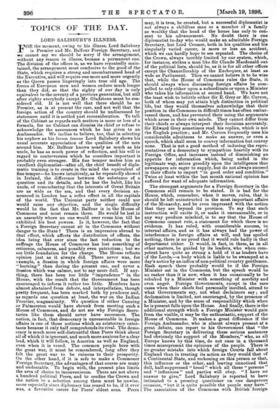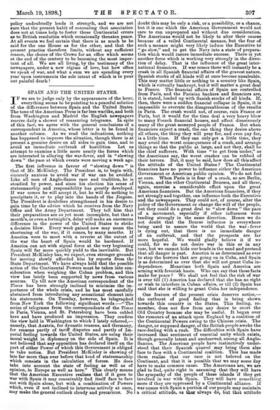TOPICS OF THE DAY.
LORD SALISBURY'S ILLNESS. FOR the moment, owing to his illness, Lord Salisbury is Premier and Mr. Balfour Foreign Secretary, and we cannot say we should be sorry if the arrangement, without any reason in illness, became a permanent one. The division of the offices is, as we have repeatedly main- tained, the arrangement most conducive to the good of the State, which requires a strong and unembarrassed head of the Executive, and will require one more and more urgently as the Queen passes lingeringly into true old age. The forces of European men and women endure much longer than they did, so that the eighty of our day is only equivalent to the seventy of a previous generation, but still after eighty everybody except Mr. Gladstone must be con- sidered old. It is not well that there should be no Premier, as is at present the case, and not well that the foreign action of the country should be undiscussed by statesmen until it is settled past reconsideration. To talk of the Cabinet as regards such matters is more or less of a formula, for no Cabinet can dismiss its chief or refuse to acknowledge the assurances which he has given to an Ambassador. We incline to believe, too, that in selecting his nephew as his locum tenons Lord Salisbury shows his usual accurate appreciation of the qualities of the men around him. Mr. Balfour knows nearly as much as his uncle, he has as much power of reflection, and his will in regard to controversies which he considers important is probably even stronger. His fine temper makes him an excellent diplomatist—after all, the chief benefit of diplo- matic training is to create in the mind the equivalent of fine temper—be knows intuitively, as he repeatedly showed in Ireland, the difference between the substance of a question and its details, and he has the habit, like his uncle, of remembering that the interests of Great Britain are as wide as the sea, and that every decision an- nounced in London has a reflex effect in all the capitals of the world. The Unionist party neither could nor would raise any objection, and the single difficulty would be the fact that Mr. Balfour is in the House of Commons and must remain there. He would be lost in an assembly where no one would ever rouse him till he exhibited his best powers. Is it, however, the fact that a Foreign Secretary cannot sit in the Commons without danger to the State ? There is an impression abroad to that effect, which affects the distribution of offices, the idea being that ever since the last reduction in the suffrage the House of Commons has lost something of reticence, calmness, and possibly even patriotism ; but we see little foundation for the charge. The House reflects opinion just as it always did. There never was, for example, a Session in which foreign affairs were more "burning" than during the present one, and never a Session which was calmer, not to say more dull. If any- thing, there has been too little " imprudence " in the House, with the result that the Government has been encouraged to inform it rather too little. Members have almost abstained from debate, and interpellation, though pretty frequent, has been marked both by prudence and, as regards one question at least, the war on the Indian Frontier, magnanimity. We question if either Canning or Palmerston would have shrunk from meeting such a House of Commons, and do not see why Foreign Secre- taries like them should never have successors. The notion, in fact, that democracy is unreasonable in foreign affairs is one of those notions which an aristocracy enter- tains because it only half comprehends its rival. The demo- cracy is much more self-distrustful than Peers think about all of which it is ignorant, and much more anxious for a clear lead, which it will follow, in America as well as England, even when it is vexed. The common people bore with the great war, it must be remembered, long after they felt the great war to be ruinous to their prosperity. On the other hand, if it is safe to make a Commoner Foreign Secretary, the advantages of that course are many and undeniable. To begin with, the present plan limits the area of choice to inconvenience. There are not above a hundred political Peers, and to confine the Crown and the nation. to a selection among them must be unwise, more especially since diplomacy has ceased to be, if it ever was, a favourite career for Peers' eldest sons. Peers may, it is true, be created, but a successful diplomatist is not always a childless man or a member of a family so wealthy that the head of the house has only to con- sent to his advancement. No doubt there is one diplomatist to-day who would make an admirable Foreign Secretary, but Lord Cromer, both in his qualities and his singularly varied career, is more or less an accident, which we can hardly hope to see repeated. The choice of the Crown, always terribly limited by our system, which, for instance, strikes a man like Sir Claude Macdonald out of the political lists, should be, as it is for all other offices except the Chancellorship of the Exchequer, at least as wide as Parliament. Then we cannot believe it to be wise that, while the House of Commons rules the State, it should always when discussing foreign affairs be com- pelled to rely either upon a subordinate or upon a Minister who takes his information at second hand. We have not the least wish to belittle either Sir E. Grey or Mr. Curzon, both of whom may yet attain high distinction in political life, but they would themselves acknowledge that their position in the Commons in difficult times has often embar- rassed them, and has prevented their using the arguments which arose in their own minds. They cannot differ from their chiefs or always interpret their decisions accurately. Sir Edward Grey sometimes read his replies, which is not the English practice ; and Mr. Curzon frequently uses his considerable adroitness to make an answer, or even a speech, which shall seem to convey information but convey none. That is not a good method of inducing the repre- sentatives of a democracy to sympathise heartily with its Foreign Office, and increases instead of diminishing an appetite for information which, being unfed in the legitimate way, seizes greedily upon the intelligence that newspapers are eager to supply, but do not always succeed in their efforts to import "in good order and condition." Twice at least within the last month national opinion has suffered for want of adequate information.
The strongest arguments for a Foreign Secretary in the Commons still remain to be stated. It is bad for the. House, which, remember, when it moves, rules, that it should be left uninstructed in the most important affairs of the Monarchy, and be even impressed with the notion that they are beyond its province. To say that such instruction will excite it, or make it unreasonable, or in any way produce mischief, is to say that the House of Commons cannot rule, a statement for which there is no evidence. It has ruled, with considerable success, in internal affairs, and as it has always had the power of interference in foreign affairs at will, and has spoiled nothing, there is no proof that it would rule badly in that department either. It would, in fact, in them, as in all other matters, be guided by its leaders, who when com- petent have quite as strong a hold of it as leaders have of the Lords,—a body which is liable to be swamped at a day's notice by an influx of non-political country gentlemen.. Rash speech there probably would be if the Foreign Minister sat in the Commons, but the speech would be no rasher than it is now, when it has occasionally to be rebuked by a Minister with something of acerbity and even anger. Foreign Governments, except in the rare cases when their chiefs feel personally insulted, attend to what Governments say, not what declaimers say ; and declamation is limited, not encouraged, by the presence of a Minister, and by the sense of responsibility which when he is present falls upon the House. And finally, there is the additional strength which a Foreign Minister would gain from the visible, it may be the enthusiastic, support of the House of Commons. It makes a great difference if the Foreign Ambassador, who is almost always present at a great debate, can report to his Government that "the Foreign Secretary in delivering these serious sentences had obviously the support of the Members," who, as all Europe knows by this time, do not once in a thousand times misrepresent the opinions of the people. There is no greater mistake into which foreign Courts fall about England than in treating its action as they would that of a Continental State, and reckoning on this person or that, this influence or the other, and leaving unnoticed that dull, half-suppressed " brod" which all these " persons " and " influences " and parties will obey. "I have no answer to give," Lord Salisbury is reported to have intimated to a pressing questioner on one dangerous occasion, "but it is quite possible the people may have." The association of the Commons with British foreign policy undoubtedly lends it strength, and we are not sure that the present habit of concealing that association does not at times help to foster those Continental errors as to British resolution which occasionally threaten peace. At all events we feel certain that there is as much to be said for the one House as for the other, and that the present practice therefore limits, without any sufficient reason, the choice of the Crown for an office which seems at the end of the century to be becoming the most impor- tant of all. We are all living, by the testimony of the newspapers, under a new regime of love, but how often we speak of war, and what a sum we are spending every year upon instruments the sole intent of which is to pour out painful death !







































 Previous page
Previous page